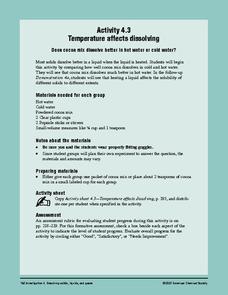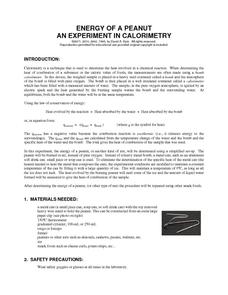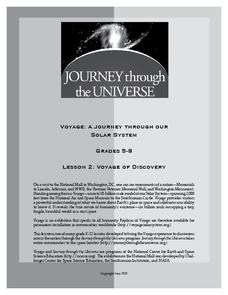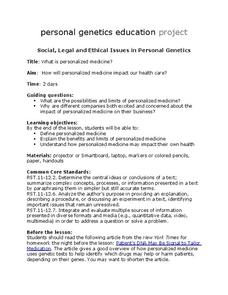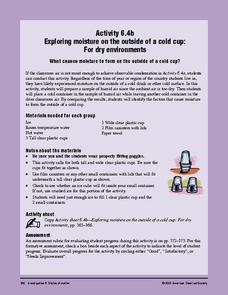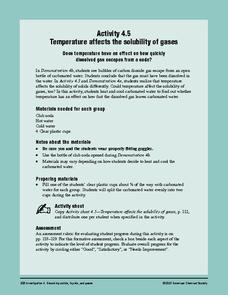American Chemical Society
Condensation
It's time to break the ice! If you are doing all of the lessons in the unit, children have already seen that increasing heat increases the rate of evaporation, but is the opposite true? Does decreasing temperature cause more condensation...
NOAA
I Can't Breathe!
The Gulf of Mexico dead zone, an area of low oxygen that kills marine life, costs the United States $82 million every year. Young scientists research anoxic ocean environments then come up with a hypothesis for the cause of the Gulf of...
Foundation for Water & Energy Education
How is Flowing Water an Energy Source? Activity A
Here is a fun little exploration of the potential energy potential of falling water. Learners drop water from various heights using a straw, and they analyze the diameter of the splash. Pair this with two more activities of the same...
NASA
Things Are Not Always What They Seem
Science is magic that works. Magical color-changing beads and a coffee can that follows voice commands are just two examples of magic tricks that rely on science. After completing a hands-on activity and an experiment investigating the...
University of Wisconsin
Measuring Slope for Rain Gardens
The slope of the land is an important feature when considering the erosion that will occur. In this resource, which is part of a rain garden unit, learners calculate the slope of the proposed garden site. Even if you are not planning a...
American Chemical Society
Temperature Affects Dissolving
Stir chocolate drink mix into hot and cold water to see if there is a difference in how quickly it dissolves. Number three in a six-lesson plan unit on dissolving, this installment investigates the effect of temperature. If you consult...
Chymist
Energy of a Peanut
Are you nuts? An engaging experiment burns nuts to find their kilocalories. Young chemists analyze at least two different types of nuts with their experimental results versus what is on the package. The resource offers a great lab...
National Wildlife Federation
When It Rains It Pours More Drought and More Heavy Rainfall
Which is worse — drought or flooding? Neither is helpful to the environment, and both are increasing due to climate change. The 16th lesson plan in a series of 21 covers the average precipitation trends for two different climates within...
California Academy of Science
Global Climate Change and Sea Level Rise
Ice is nice, and its condition on the planet has a significant effect. Junior geoscientists experiment with ice melting in both water and on land to discover how each affect the rising sea level. This detailed lesson plan outline even...
Journey Through the Universe
Voyage of Discovery
Did you know that Pluto is smaller than the United States of America? It is difficult to conceptualize the size of planets and the distance between them, and the lesson addresses those exact issues. After a discussion, pupils create...
Staten Island Zoo
The African Savanna
Are you thinking about taking your class to the local zoo? Kids of all ages love visiting exotic animals in order to learn about biodiversity, habitat, and animal adaptations. Here is a 44-page activity guide that provides educators with...
Foundation for Water & Energy Education
How is Flowing Water an Energy Source? Activity B
Explore the world's water without leaving the classroom! In this second of three uncomplicated but wonderful activities, physical science learners feel the pressure of water. They discover that the deeper the water, the stronger the...
American Chemical Society
Changing the Density of a Liquid - Heating and Cooling
During a unit on density, pupils ponder whether or not temperature affects this property. By carefully inserting blue cold water and yellow hot water into a room-temperature sample, they will see the answer. Make sure to have done the...
Personal Genetics Education Project
Personalized Medicine
Genetics learners read an article and watch a video about personalized medicine and the hope it holds for treating patients more specifically than doctors currently are able to. They research, design, and produce a brochure about the...
Curated OER
Science Review Using Movie Maker
Students reinforce science concepts learned throughout the year using Movie Maker. Eighth grade students work with fourth grade students in which they create a movie project about a science topic after completing a graphic organizer.
University of Georgia
Flavor of Organic Chemistry
Introduce organic chemistry through an analysis of flavor. A three-part unit begins with an overview of the components of flavor. Next, scholars prepare esters through esterification. Finally, they examine how all senses have an impact...
Virginia Department of Education
States of Matter
Scientists have been studying exothermic reactions before they were cool. The lesson begins with a discussion and a demonstration of heat curves. Scholars then determine the heat of fusion of ice and the heat needed to...
Virginia Department of Education
Acid-Base Theory
Litmus paper, why so blue? A chemistry lesson plan includes a pre-lab activity, practice calculating pH, an experiment measuring the pH in acids and bases, a titration demonstration, and a titration experiment.
Virginia Department of Education
Thermochemistry: Heat and Chemical Changes
What makes particles attract? Here, learners engage in multiple activities that fully describe colligative properties and allow the ability to critically assess the importance of these properties in daily life. Young chemists...
NASA
The Big Climate Change Experiment Lesson 1: Pre-Exploration
Most have heard of climate change, but what does it really mean? Scholars first answer a set of pre-assessment questions about climate change to help instructors gauge how much they know. They listen to a video lecture, watch a news...
Teach Engineering
Dirty Decomposers
Do not let the class just sit and rot. Pupils learn how decomposition and nutrient recycling is important to an ecosystem. Groups design an experiment to determine how environmental conditions affect decomposition. They develop a poster...
American Chemical Society
Exploring Moisture on the Outside of a Cold Cup: For Dry Environments
If the area you live in is arid, or the preceding experiment in this unit didn't yield obvious results, use this one in place of it to help reveal where condensation comes from. The mini unit that this is part of a comprehensive...
American Chemical Society
Temperature Affects the Solubility of Gases
Dare your class to drive dissolved carbon dioxide out of carbonated liquid at different temperatures to discover if there is a difference in rate. To make this experiment more sound, have explorers use equally measured amounts of soda...
Curated OER
Ornithology and Real World Science
Double click that mouse because you just found an amazing instructional activity! This cross-curricular Ornithology instructional activity incorporates literature, writing, reading informational text, data collection, scientific inquiry,...





